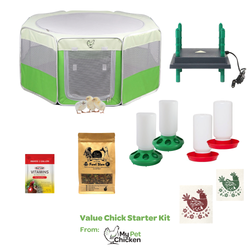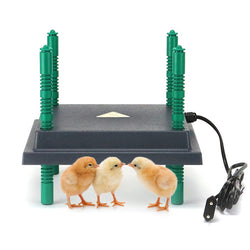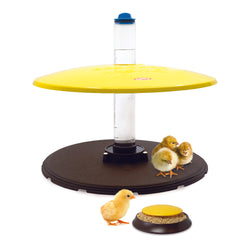How many chickens should I get?
Back to blog
We'd like to answer this question, "dozens and hundreds!" because keeping chickens is so wonderful--but for the health and safety of the birds (and the financial and psychological well-being of our customers!) it's best to actually plan and strategize before you start your flocks.
In light of that, here are some factors to consider when deciding how many birds to get:


In light of that, here are some factors to consider when deciding how many birds to get:
-
The social needs of chickens
Chickens are flock animals that interact with on each other in various ways including dust bathing, grooming, broodiness and sharing egg boxes, chick-raising, warmth, protection, and perhaps even chicken friendship. Because of this, it's not usually a good idea to keep just one. We recommend that you start with at least two chickens, but if possible, three or more is even better. Why? If you have three or more birds and one of them dies, the others still have flock-mates and are not alone.

-
Your budget
So you're not independently wealthy? Join the club! Since most of us don't have a money tree growing in our backyard, it's important to carefully determine how much of your budget can be devoted to chicken keeping. Startup costs are usually highest, but you'll also want to take monthly maintenance costs into account. To begin raising baby chicks, you will need the chicks themselves, a brooder, feeder and waterer, and heat source. Once they are old enough to go outside permanently, you'll need a coop, run area (if you can't let them free range), feeder and waterer, and feed. Also, bear in mind the potential vet bills that may lie in your future.
Depending on the size of your flock and your existing chicken-keeping resources, startup costs could run into the hundreds of dollars, with the coop usually being the most expensive component. We have more information about what you'll need to start keeping chickens in our Chicken Care Guide.

-
Space
How much room can you dedicate to your flock? You'll need to make sure you provide enough space in your coop and run area, and yard (if you allow free ranging). Chickens in over-crowded conditions are more prone to stress, fighting, and disease, so it's important to make sure you give them enough area to be comfortable and happy. We recommend at least 4 square feet per bird in the coop area if they have plenty of room to range during the days, and at least 10 square feet per bird if they are permanently confined. A general rule of thumb is: the more space you can provide, the more relaxed your flock will be.
Chapter five of our Chicken Care Guide has more information to help you plan your coop.

-
The purpose for your flock
You might keeps chickens primarily as pets, for show, for meat, for insect control, or a combination of reasons. Each different purpose will influence the number of birds you should have in your flock.
For example, if you want chickens primarily for eggs, it will be important to calculate your family's estimated weekly egg consumption and purchase the correct number and breeds to meet your needs. For example, if each member of a family of four eats one egg per day, you'll need your flock to produce 28 eggs per week. Our Breeds List shows each chicken breed with the anticipated number of eggs they will lay each week. -
Your safe minimum order
Because of our special packaging methods, we are able to ship smaller orders of chicks to meet the needs of our awesome small-flock backyard chicken enthusiasts. But for the safety of the chicks in shipping, we do have a minimum order which is based on the customer's zip code, anticipated time in shipping, and time of year (our minimum orders go up in winter to protect the chicks from the cold). You can calculate your minimum order here: Minimum Order Calculator

-
Your Local Ordinances
Before you start your flock, be sure to check your local laws and homeowners regulations to find out if you can keep chickens legally, and if so, if there are any restrictions on how many birds you can keep. -
Chicken math!
Chicken math is a curious psychological phenomenon in which chicken keepers always "need" (a.k.a."want") more chickens than they already have. For example, you may have determined that you need 10 hens, but according to chicken math, that means you "need" 12 hens (or 15 or 20?--chicken math is subjective!). While we're normally big fans of chicken math, it's important to be aware that it can cause you to order more chickens than you should actually keep. You don't want to have more birds than your space and budget permit! That would not be good for the birds or for you and your family.
But we have also seen chicken math work the other way, when a customer orders a small number of chicks out of an abundance of caution, and then regrets immediately that they didn't get more when they realize how wonderful they are, how they're easier to keep than originally thought, and how they want more egg-laying pets. Our best advice regarding chicken math: be aware of it, plan and strategize before starting, but don't overthink it and get fewer birds than you actually need and can care for appropriately.



